Fleurs du Mal Magazine


Just in time for his 99th birthday, New Directions is proud to present a swift, terrific chronological selection of Lawrence Ferlinghetti’s greatest poems.
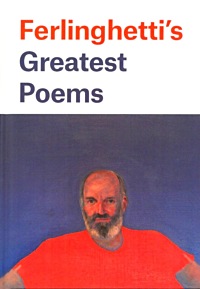 Through this tight lens, it is now possible to see Ferlinghetti—a brilliant and prolific poet—in a richer, broader, and more complex way. From his very first landmark books—Pictures of the Gone World (City Lights, 1955) and A Coney Island of the Mind (New Directions, 1958)—to new work, Ferlinghetti’s Greatest Poems displays every stage of this multifaceted writer’s long and celebrated career. It’s exciting to revisit in one slender volume so much of the splendid, playful, and trenchant work of one of America’s greatest and most popular poets.
Through this tight lens, it is now possible to see Ferlinghetti—a brilliant and prolific poet—in a richer, broader, and more complex way. From his very first landmark books—Pictures of the Gone World (City Lights, 1955) and A Coney Island of the Mind (New Directions, 1958)—to new work, Ferlinghetti’s Greatest Poems displays every stage of this multifaceted writer’s long and celebrated career. It’s exciting to revisit in one slender volume so much of the splendid, playful, and trenchant work of one of America’s greatest and most popular poets.
“A brave man and a brave poet.”––Bob Dylan
Lawrence Ferlinghetti, poet and founder of City Lights Books, author of A Coney Island of the Mind and Pictures of the Gone World, among numerous other books, has been drawing from life since his student days in Paris where he frequented the Academie Julien and where he did his first oil painting.
“Lawrence gets you laughing and then hits you with the truth.”––Francis Ford Coppola
Title: Ferlinghetti’s Greatest Poems
Author: Lawrence Ferlinghetti
Edited by Nancy J. Peters
Publisher New Directions Publishing Corporation
Format Hardcover, $16.95
144 pp.
ISBN-10 081122712X
ISBN-13 9780811227124
Publication Date 21 November 2017
new poetry books
fleursdumal.nl magazine
More in: #Beat Generation Archives, - Book News, - Bookstores, Archive E-F, Archive E-F, Art & Literature News
Angst beheerst zijn nachten. Nachtmerries. Vreemde dromen die voortduren als hij wakker is. Waarom komen er steeds van die krankzinnige verhalen in hem op? Het plafond als een allesverzwelgende zee. Maar ook al is hij helemaal wakker, toch kan hij het rare verhaal over verdrinkende steden en dorpen en de later opnieuw verdampende zee niet van zich afzetten.
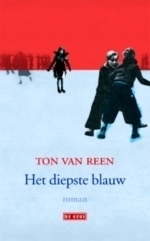 Als kind al beleefde hij van die wonderlijke verhalen. Vaak was hij een reus. De sterkste. Om zichzelf te bewijzen. Omdat hij groter en sterker wilde zijn dan Tijger, die meestal vlugger en gehaaider was. Sterker willen zijn was lijfsbehoud.
Als kind al beleefde hij van die wonderlijke verhalen. Vaak was hij een reus. De sterkste. Om zichzelf te bewijzen. Omdat hij groter en sterker wilde zijn dan Tijger, die meestal vlugger en gehaaider was. Sterker willen zijn was lijfsbehoud.
Het is iets in zijn hoofd. Zijn hele leven al komen er de vreemdste dingen in hem op. Zijn fantasieën brengen hem overal, maar zelden naar hier, naar dit vertrek, waar hij altijd alleen is.
Hij vouwt zijn kussen dubbel, probeert overeind te komen om de kamer te overzien.
Het irriteert hem dat de deur van de slaapkamer openstaat. Hij slaapt altijd met de deur open, niet omdat hij dat wil, maar omdat Lizet te beroerd is om de deur dicht te doen. Ze zegt dat ze hem dan beter kan horen als er ‘s nachts iets mis is. Met die deur open is hij nooit helemaal alleen. In huis hoort hij alles, ‘s nachts zelfs het druppelen van de kraan in de keuken. Tot hij er gek van wordt.
Het is pas half acht. Hij moet nodig plassen, maar hij moet nog een half uur geduld hebben, voordat Lizet hem uit bed haalt en hem naar het toilet brengt: het aangepaste toilet met hoge pot en handgrepen, ingebouwd in de kleine badcel die in een hoek van zijn slaapkamer is gemaakt. In geval van hoge nood kan hij in de fles plassen, maar dat doet hij liever niet. Lizet vindt het niet prettig om de fles schoon te maken. Dat ziet hij aan haar gezicht, die enkele keer dat het niet anders kan. Het gebeurt soms, als hij voor het slapen gaan bier heeft gedronken. Hij heeft geen zin in toestanden. Ruzie moet hij voorkomen. Dan maar geen bier.
Eindelijk rinkelt de wekker. Acht uur. Hij zet hem af. Direct daarna klinkt het hoge rammelen van de wekker op Lizets kamer. Haar dansende wekker staat in een soepbord vol muntjes. Even later hoort hij haar uit haar kamer komen. Haar sloffende stappen op de overloop. Hij sluit zijn ogen.
`Waarom word je altijd schreeuwend wakker?’ zegt ze, de kamer binnenkomend.
Hij kan nu niet meer doen of hij slaapt en opent zijn ogen opnieuw. In haar kamerjas staat ze naast zijn bed.
`Ik heb vreselijk gedroomd.’
`Je hebt een slecht geweten.’
Hij zegt er maar niets op. Hij zou gaan schreeuwen. Nooit vertelt hij haar iets over zijn dromen. Lizet ergert zich nog steeds aan Thija. Hij weet het. Eén keer, een paar jaar geleden, heeft hij verteld van het vliegtuig dat tegen de silo vloog. Hij vertelde het toen aan zijn kleindochter. Afke was een jaar of tien. Hij was pas een paar maanden thuis uit het revalidatiecentrum. Lizet had het toevallig gehoord. Ze had hem uitgelachen. Ze vond zijn droom belachelijk, de droom van een kind. Misschien, maar dat had ze waarschijnlijk niet durven zeggen, had ze gedacht dat hij na dat ongeluk weer een kind was geworden. Dat ze hem als een kind thuis had gekregen. Een lastig kind, dat kort gehouden moest worden en dat zelf niet mocht bepalen wanneer het uit bed werd gehaald en verzorgd.
Lizet loopt naar het toilet. Zoals gewoonlijk vergeet ze de deur achter zich te sluiten. Sinds de badcel met toilet op zijn kamer is, gebruikt zij het ook, en daarom haat hij het. Hij hoort de straal tegen de pot. Het maakt hem razend. `Waarom sluit je de deur niet!’ wil hij roepen, maar hij roept niet. Ze is hem de baas.
Haar ochtendjas goed trekkend, komt ze naar buiten. Ze drukt op de knop om het hoofdeinde van zijn bed recht te zetten, slaat de deken terug, tilt zijn benen uit bed en schuift hem in één beweging in de rolstoel.
`Tandenpoetsen.’
`Eerst naar het toilet. Ik moet nodig.’
`Vandaag wil je eerst dit, morgen wil je eerst dat.’ Haar stem is hoog van ergernis.
Ze rolt hem naar het toilet. Hij kan zelf uit de rolstoel op de pot schuiven. Omdat hij zijn armen sterk houdt. Het zou een te grote vernedering voor hem zijn om ook nog door haar op de pot te worden gezet. Of zal hij als het zover komt, om te overleven, weer opnieuw zijn grens verleggen? Eerder had hij het plan er een eind aan te maken als hij zichzelf niet meer kon aankleden. Maar toen het zover was, had hij uitvluchten gezocht om toch te blijven leven. Om voor iemand te leven. Gelukkig was Afke er. Voor haar verlegt hij zijn grens steeds verder naar beneden.
Afke herinnert hem aan Marjan als kind. Toen ze samen alles deden. Roeien op de Wijer. Door de bossen hollen en verstoppertje spelen. Jammer dat hij dat met Afke niet kan. Hij kan geen meter lopen. Hij kan nooit meer door de modder spatten. Nooit meer het zachte mos onder zijn blote voeten voelen. De spitse dennennaalden, het was fijn om bij het lopen pijn aan zijn voeten te voelen. Zijn lichaam wilde weten dat het op voeten gedragen werd. Dat hij juist zijn voeten moest verliezen! Als hij denkt aan de wandelingen door de bossen, voelt hij de pijn nog. Fantoompijn. De tinteling die door zijn hele lijf trok als de naalden in zijn voeten staken. Het deed hem goed.
Hij wacht op Lizet, die voor de spiegel wat aan haar haar doet. Eindelijk verlaat ze de badcel. Voorzichtig glijdt hij, de armen geklemd rond de dragers, op de pot en schuift de pyjamabroek over zijn benen.
Altijd draagt hij blauwe pyjama’s. Blauwe hemden. Blauwe broeken. Blauwe pakken. Als kind wilde hij het niet. Later wist hij niet beter meer. Aan hem bleef alles blauw. De kleur van water. Van de Wijer. Hij kan niet meer leven zonder blauw.
Ton van Reen: Het diepste blauw (026)
wordt vervolgd
fleursdumal.nl magazine
More in: - Book Stories, - Het diepste blauw, Archive Q-R, Reen, Ton van
A look back at the cultural and political force of Pulitzer Prize–winning poet Gwendolyn Brooks, in celebration of her hundredth birthday
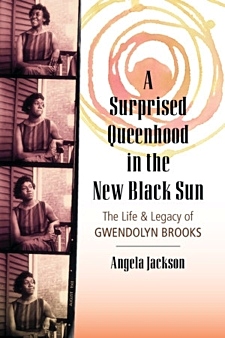 Pulitzer-Prize winning poet Gwendolyn Brooks is one of the great American literary icons of the twentieth century, a protégé of Langston Hughes and mentor to a generation of poets, including Sonia Sanchez, Nikki Giovanni, and Elizabeth Alexander.
Pulitzer-Prize winning poet Gwendolyn Brooks is one of the great American literary icons of the twentieth century, a protégé of Langston Hughes and mentor to a generation of poets, including Sonia Sanchez, Nikki Giovanni, and Elizabeth Alexander.
Her poetry took inspiration from the complex portraits of black American life she observed growing up on Chicago’s Southside—a world of kitchenette apartments and vibrant streets. From the desk in her bedroom, as a child she filled countless notebooks with poetry, encouraged by the likes of Hughes and affirmed by Richard Wright, who called her work “raw and real.”
Over the next sixty years, Brooks’s poetry served as witness to the stark realities of urban life: the evils of lynching, the murders of Emmett Till and Malcolm X, the revolutionary effects of the civil rights movement, and the burgeoning power of the Black Arts Movement. Critical acclaim and the distinction in 1950 as the first black person ever awarded a Pulitzer Prize helped solidify Brooks as a unique and powerful voice.
 Now, in A Surprised Queenhood in the New Black Sun, fellow Chicagoan and award-winning writer Angela Jackson delves deep into the rich fabric of Brooks’s work and world. Granted unprecedented access to Brooks’s family, personal papers, and writing community, Jackson traces the literary arc of this artist’s long career and gives context for the world in which Brooks wrote and published her work. It is a powerfully intimate look at a once-in-a-lifetime talent up close, using forty-three of Brooks’s most soul-stirring poems as a guide.
Now, in A Surprised Queenhood in the New Black Sun, fellow Chicagoan and award-winning writer Angela Jackson delves deep into the rich fabric of Brooks’s work and world. Granted unprecedented access to Brooks’s family, personal papers, and writing community, Jackson traces the literary arc of this artist’s long career and gives context for the world in which Brooks wrote and published her work. It is a powerfully intimate look at a once-in-a-lifetime talent up close, using forty-three of Brooks’s most soul-stirring poems as a guide.
 From trying to fit in at school (“Forgive and Forget”), to loving her physical self (“To Those of My Sisters Who Kept Their Naturals”), to marriage and motherhood (“Maud Martha”), to young men on her block (“We Real Cool”), to breaking history (“Medgar Evers”), to newfound acceptance from her community and her elevation to a “surprising queenhood” (“The Wall”), Brooks lived life through her work.
From trying to fit in at school (“Forgive and Forget”), to loving her physical self (“To Those of My Sisters Who Kept Their Naturals”), to marriage and motherhood (“Maud Martha”), to young men on her block (“We Real Cool”), to breaking history (“Medgar Evers”), to newfound acceptance from her community and her elevation to a “surprising queenhood” (“The Wall”), Brooks lived life through her work.
Jackson deftly unpacks it all for both longtime admirers of Brooks and newcomers curious about her interior life. A Surprised Queenhood in the New Black Sun is a commemoration of a writer who negotiated black womanhood and incomparable brilliance with a changing, restless world—an artistic maverick way ahead of her time.
What shall I give my children? who are poor,
Who are adjudged the leastwise of the land,
Who are my sweetest lepers, who demand
No velvet and no velvety velour;
But who have begged me for a brisk contour,
Crying that they are quasi, contraband
Because unfinished, graven by a hand
Less than angelic, admirable or sure.
from ‘The Children of the Poor’
Angela Jackson is an award-winning poet, playwright, and novelist. She is the author of numerous collections of poetry, including the National Book Award–nominated And All These Roads Be Luminous: Poems Selected and New. Her novel Where I Must Go won the American Book Award in 2009. Its sequel, Roads, Where There Are No Roads, was published in 2017. Additionally, Jackson was longlisted for the Pulitzer Prize and a longlist finalist for the PEN Open Book Award for her 2015 poetry collection, It Seems Like a Mighty Long Time. Other honors include a Pushcart Prize, Academy of American Poets Prize, TriQuarterly’s Daniel Curley Award, and the Poetry Society of America’s Shelley Memorial Award. Jackson lives in Chicago.
A Surprised Queenhood in the New Black Sun
The Life & Legacy of Gwendolyn Brooks
By Angela Jackson
Paperback – $18.00
ISBN 9780807059128
Published by Beacon Press
208 Pages
May 29, 2018
new books
fleursdumal.nl magazine
More in: - Book News, Archive A-B, Archive A-B, Archive I-J, Archive I-J, BIOGRAPHY, REPRESSION OF WRITERS, JOURNALISTS & ARTISTS

Sleep Now,
O Sleep Now
Sleep now, O sleep now,
O you unquiet heart!
A voice crying “Sleep now”
Is heard in my heart.
The voice of the winter
Is heard at the door.
O sleep, for the winter
Is crying “Sleep no more.”
My kiss will give peace now
And quiet to your heart — –
Sleep on in peace now,
O you unquiet heart!
James Joyce
(1882-1941)
Sleep Now, O Sleep Now
fleursdumal.nl magazine
More in: Archive I-J, Archive I-J, Joyce, James, Joyce, James
Rainer Maria Rilke feierte die Liebe, verschrieb sich ihr mit ganzer Seele. Die Frauen standen für ihn im Mittelpunkt.
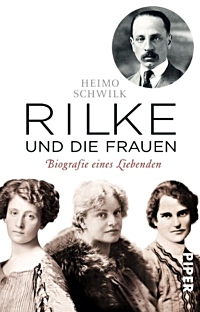 Angefangen bei seiner innig geliebten Mutter Sophia und der gestrengen »Übermutter« Lou Andreas-Salomé über die Bildhauerin Clara Westhoff bis zu der großzügigen Mäzenin Fürstin von Thurn und Taxis. In seiner neuen, meisterlich geschriebenen Biografie erzählt Heimo Schwilk von diesen Frauen und ihren Schicksalen.
Angefangen bei seiner innig geliebten Mutter Sophia und der gestrengen »Übermutter« Lou Andreas-Salomé über die Bildhauerin Clara Westhoff bis zu der großzügigen Mäzenin Fürstin von Thurn und Taxis. In seiner neuen, meisterlich geschriebenen Biografie erzählt Heimo Schwilk von diesen Frauen und ihren Schicksalen.
Ein Buch über die Liebe – und wie sie sich in großer Dichtung vollendet.
Heimo Schwilk, geboren 1952 in Stuttgart, Dr. phil., ist Autor zahlreicher Bücher über Politik und Literatur. Seine großen Biografien über Ernst Jünger und Hermann Hesse wurden im In- und Ausland hoch gelobt. Er war lange Jahre Leitender Redakteur der Welt am Sonntag und lebt in Berlin. 1991 wurde er mit dem Theodor-Wolff-Preis für herausragenden Journalismus ausgezeichnet.
Heimo Schwilk
Rilke und die Frauen
Biografie eines Liebenden
‘Piper’ Taschenbuch
Piper Verlag GmbH
Mit 22 Abbildungen
EAN: 9783492308878
ISBN: 3492308872
2016
336 Seiten
kartoniert
€ 11,00
new books
fleursdumal.nl magazine
More in: - Book News, Archive Q-R, Archive Q-R, Archive S-T, Art & Literature News, Rilke, Rainer Maria, The Ideal Woman
Gathered on the occasion of Robert Lowell’s one hundredth birthday, New Selected Poems offers a fresh and illuminating representation of one of the great careers in twentieth-century poetry.
 The renowned and controversial author of many books of poems, plays, and translations, Lowell was one of the United States’ most honoured poets, winning the Pulitzer Prize in Poetry in 1947 and 1974, the National Book Award, and the National Book Critics Circle Award.
The renowned and controversial author of many books of poems, plays, and translations, Lowell was one of the United States’ most honoured poets, winning the Pulitzer Prize in Poetry in 1947 and 1974, the National Book Award, and the National Book Critics Circle Award.
His ongoing interrogation of his family legacy, his personal struggle with manic depression, and his mastery of the tradition of poetry in English formed the groundbreaking autobiographical foundation of Life Studies (1959) and the books that followed it, including For the Union Dead (1964), Near the Ocean (1967), History (1973), and Day by Day (1977).
Katie Peterson’s incisive selection of Lowell’s poems draws attention to ‘the perishability of life, its twinned quality of fragility and repetition, as framed by the structured evanescence of daily consciousness.’ Lowell’s own intense dramas and struggles are the substrate he drew on in his restless search to make sense of, and fix, shape-shifting experience – not his, but ours. As Peterson says, Lowell was ‘constitutionally immune to any stultifying permanence either of form or of spirit.’ Her brilliant new reading of Lowell shows us his work constantly breaking, renewing, transforming, as he strives restlessly, over and over, to find an elusive unity.
Robert Lowell (1917-1977) was born in Boston. He was recognised as an accomplished poet in his own lifetime, and along with Elizabeth Bishop, John Berryman and Sylvia Plath he created the fashion and generated the force of American poetry over the 1950s, 60s, and 70s. Life Studies, published in 1959, marked a watershed. It initiated an autobiographical project which would dominate his oeuvre thereafter, and is now regarded as one of the most influential books of the century. He received a Pulitzer Prize for Lord Weary’s Castle (1946) and another for The Dolphin (1973).
New Selected Poems
by Robert Lowell (Author),
Katie Peterson (Editor)
ISBN 9780571339488
Format Paperback
Published 03/08/2017
Length 272 pages
£14.99
Publisher: Farrar, Straus and Giroux
Language: English
ISBN-10: 0374251339
ISBN-13: 978-0374251338
new poetry books
fleursdumal.nl magazine
More in: - Book News, Archive K-L, Archive K-L, Art & Literature News, Robert Lowell
Voor het eerst ziet hij angst in de ogen van Tijger. Tijger, die nooit bang is. Tijger, die de zeven levens van een kat heeft. Met angst kijkt hij naar het stuur van zijn fiets, waarvan de rubberen handvatten zijn gesmolten door de blikseminslag.
 Het stuur gloeit. Tijger spuwt erop. Het sist. Pas dan laat Tijger de fiets in het gras vallen. Hij voelt aan zijn oren, zijn neus. Alleen het vooruitspringende haar op zijn voorhoofd is wat geschroeid.
Het stuur gloeit. Tijger spuwt erop. Het sist. Pas dan laat Tijger de fiets in het gras vallen. Hij voelt aan zijn oren, zijn neus. Alleen het vooruitspringende haar op zijn voorhoofd is wat geschroeid.
`Jezus, jezus’, zegt hij tien keer achter elkaar, alsof Jezus ervoor heeft gezorgd dat hij het er levend van af heeft gebracht.
`Je bent nog heel’, zegt Thija. Blij dat Tijger de inslag heeft overleefd, omarmt ze hem, drukt haar wang tegen zijn wang.
Mels weet niet wat hij moet zeggen, zo verbijsterd is hij nog door het felle licht dat op Tijgers stuur uit elkaar spatte. Verbijsterd door de angst die hij in de ogen van Tijger heeft gezien.
Ton van Reen: Het diepste blauw (025)
Een roman als feuilleton
wordt vervolgd
fleursdumal.nl magazine
More in: - Book Stories, - Het diepste blauw, Archive Q-R, Reen, Ton van
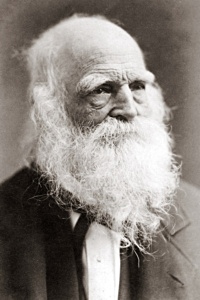
To the Fringed Gentian
Thou blossom bright with autumn dew,
And coloured with the heaven’s own blue,
That openest when the quiet light
Succeeds the keen and frosty night.
Thou comest not when violets lean
O’er wandering brooks and springs unseen,
Or columbines, in purple dressed,
Nod o’er the ground-bird’s hidden nest.
Thou waitest late and com’st alone,
When woods are bare and birds are flown,
And frosts and shortening days portend
The aged year is near his end.
Then doth thy sweet and quiet eye
Look through its fringes to the sky,
Blue—blue—as if that sky let fall
A flower from its cerulean wall.
I would that thus, when I shall see
The hour of death draw near to me,
Hope, blossoming within my heart,
May look to heaven as I depart.
William Cullen Bryant
(1794-1878)
To the Fringed Gentian
fleursdumal.nl magazine
More in: Archive A-B, Archive A-B, CLASSIC POETRY
An “astounding” (Terrance Hayes) debut collection of poems – Winner of the 2016 National Poetry Series Competition
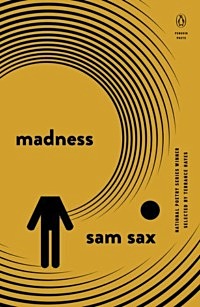 In this powerful debut collection, sam sax explores and explodes the linkages between desire, addiction, and the history of mental health. These brave, formally dexterous poems examine antiquated diagnoses and procedures from hysteria to lobotomy; offer meditations on risky sex; and take up the poet’s personal and family histories as mental health patients and practitioners.
In this powerful debut collection, sam sax explores and explodes the linkages between desire, addiction, and the history of mental health. These brave, formally dexterous poems examine antiquated diagnoses and procedures from hysteria to lobotomy; offer meditations on risky sex; and take up the poet’s personal and family histories as mental health patients and practitioners.
Ultimately, Madness attempts to build a queer lineage out of inherited language and cultural artifacts; these poems trouble the static categories of sanity, heterosexuality, masculinity, normality, and health. sax’s innovative collection embodies the strange and disjunctive workings of the mind as it grapples to make sense of the world around it.
About the Author: sam sax is a queer Jewish writer and educator. He’s received fellowships from the National Endowment for the Arts, Lambda Literary, The MacDowell Colony, the Blue Mountain Center, and the Michener Center for Writers. He’s the winner of the 2016 Iowa Review Award and his poems have appeared in The American Poetry Review, Gulf Coast, Ploughshares, Poetry, and other journals.
Madness
By Sam Sax
Part of National Poetry Series
Category: Poetry
Published by Penguin Books
Paperback
Sep. 2017
96 Pages
$18.00
ISBN 9780143131700
new poetry
fleursdumal.nl magazine
More in: - Book News, Archive S-T, Art & Literature News, EDITOR'S CHOICE
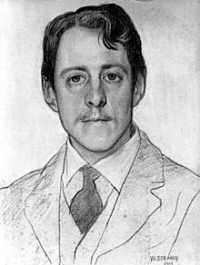
The Pity of It
I walked in loamy Wessex lanes, afar
From rail-track and from highway, and I heard
In field and farmstead many an ancient word
Of local lineage like “Thu bist,” “Er war,”
“Ich woll,” “Er sholl,” and by-talk similar,
Nigh as they speak who in this month’s moon gird
At England’s very loins, thereunto spurred
By gangs whose glory threats and slaughters are.
Then seemed a Heart crying: “Whosoever they be
At root and bottom of this, who flung this flame
Between folk kin tongued even as are we,
“Sinister, ugly, lurid, be their fame;
May their familiars grow to shun their name,
And their brood perish everlastingly.”
Laurence Binyon
(1869 – 1943)
The Pity of It
fleursdumal.nl magazine
More in: Archive A-B, CLASSIC POETRY, WAR & PEACE
A powerful new collection of poetry from the National Book Critics Circle Award nominee and recipient of the Forward Poetry Prize.
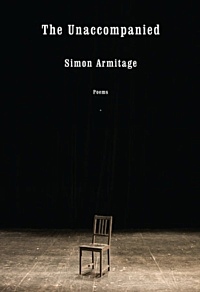
In The Unaccompanied, Armitage gives voice to the people of Britain with a haunting grace.
We meet characters whose sense of isolation is both emotional and political, both real and metaphorical, from a son made to groom the garden hedge as punishment, to a nurse standing alone at a bus stop as the centuries pass by, to a latter-day Odysseus looking for enlightenment and hope in the shadowy underworld of a cut-price supermarket.
We see the changing shape of England itself, viewed from a satellite “like a shipwreck’s carcass raised on a sea-crane’s hook, / nothing but keel, beams, spars, down to its bare bones.”
In this exquisite collection, Armitage X-rays the weary but ironic soul of his nation, with its “Songs about mills and mines and a great war, / lines about mermaids and solid gold hills, / songs from broken hymnbooks and cheesy films”–in poems that blend the lyrical and the vernacular, with his trademark eye for detail and biting wit.
Simon Armitage was born in West Yorkshire and is Professor of Poetry at the University of Sheffield. A recipient of numerous prizes and awards, he has published eleven collections of poetry, including Seeing Stars, Paper Aeroplane: Selected Poems 1989 – 2014, and his acclaimed translation of Sir Gawain and the Green Knight.
The Shout: Selected Poems, was nominated for the National Book Critics Circle Award and his translation of the medieval poem Pearl received the 2017 PEN Award for Poetry in Translation. He writes extensively for radio and television, has published three best-selling non-fiction titles, and his theatre works include The Last Days of Troy, performed at Shakespeare’s Globe in London. He has taught at the University of Iowa’s Writers’ Workshop, and in 2015 was appointed Professor of Poetry at Oxford University.
Simon Armitage
The Unaccompanied
Poems
Published by Knopf
Hardcover
$27.00
Aug. 2017
96 Pages
ISBN 9781524732424
new poetry
fleursdumal.nl magazine
More in: #Editors Choice Archiv, - Book News, Archive A-B, Archive A-B, Armitage, Simon, Art & Literature News, Mermaids

Ontgoocheling
Laat mij niet almaar zinloos lijden,
Zeg niet dat jij nog van mij houdt,
Wat er ook was in vroeger tijden,
Het laat mijn arme hart nu koud!
Nee, ik geloof niet in jouw liefde,
Nee, ik geloof daar niet meer aan,
Sinds jij mijn arme ziel zo griefde,
Kan ik mij niet meer laten gaan!
Vergeet de uren, thans vervlogen,
Vergroot de blinde wanhoop niet,
Mijn zieke hart, zozeer bedrogen,
Zag graag dat jij het rusten liet!
Ik slaap, ben net in slaap gevallen,
Vergeet jouw dromen van weleer,
Wat er ook was, ‘t is ons ontvallen,
Dit hart krijg jij niet wakker meer.
Jevgeni Baratynski,
(1800 – 1844)
Разуверение,
gedicht 1821,
vertaling Paul Bezembinder, 2016.
(Meer over Paul Bezembinder is te vinden op zijn website: www.paulbezembinder.nl)
fleursdumal.nl magazine
More in: Archive A-B, Archive A-B, Baratynski, Bezembinder, Paul, CLASSIC POETRY
Thank you for reading Fleurs du Mal - magazine for art & literature